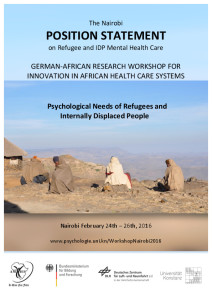
This statement is the product of a first workshop initiated by the German Federal Ministry of Education and Research that brought together a group of established and young researchers, clinicians and NGOs discussing ways to integrate the mental health care of displaced people into African national mental health care systems. In this paper, the group called for a better cooperation between national mental health care systems and international organizations supporting the mental health of displaced people. They criticized the situation that in many countries parallel mental health care systems are established and that both systems suffered from lack of resources. The group recommended that national mental health systems should be build up and further developed in the context of serving displaced peoples’ mental health needs. They identified several obstacles, e.g. the unwillingness of governments to prioritize mental health care and the challenge for NGOs to cooperate with government structures.
For the Nairobi Position Statement on Refugee and IDP Mental Health Care please follow this link.
The Nairobi Position Statement on Refugee and IDP Mental Health Care

This statement is the product of a first workshop initiated by the German Federal Ministry of Education and Research that brought together a group of established and young researchers, clinicians and NGOs discussing ways to integrate the mental health care of displaced people into African national mental health care systems. In this paper, the group called for a better cooperation between national mental health care systems and international organizations supporting the mental health of displaced people. They criticized the situation that in many countries parallel mental health care systems are established and that both systems suffered from lack of resources. The group recommended that national mental health systems should be build up and further developed in the context of serving displaced peoples’ mental health needs. They identified several obstacles, e.g. the unwillingness of governments to prioritize mental health care and the challenge for NGOs to cooperate with government structures.
For the Nairobi Position Statement on Refugee and IDP Mental Health Care please follow this link.

